In the fast-paced world of business, where knowledge is power and expertise is highly valued, admitting that you don’t know something can be a daunting prospect.
However, contrary to popular belief, acknowledging your limits can actually be a sign of professionalism, integrity, and intellectual curiosity. Instead of shying away from the unknown, mastering the art of saying “I don’t know” can elevate your credibility and open doors to new possibilities.
In this blog post, let’s explore how to say I don’t know professionally and we will delve into the fascinating realm of expressing uncertainty with finesse and grace, exploring different ways to convey the message of not having an immediate answer.
Whether you find yourself in an interview, a business meeting, or even an email exchange, we will guide you through a plethora of approaches that can help you navigate these situations with confidence, intelligence, and perhaps even a touch of humor.
While the phrase “I don’t know” might appear blunt or unhelpful, we will discover the many creative alternatives that exist to articulate uncertainty professionally.
By learning these alternative expressions, you will be equipped with a toolkit of language that allows you to maintain your professional demeanor while still acknowledging the limits of your knowledge.
Additionally, we will explore the importance of providing constructive responses in place of a simple admission of ignorance.
Instead of leaving the conversation at a standstill, we will explore strategies to engage others, seek further information, or offer alternative solutions, thus demonstrating your resourcefulness and problem-solving abilities.
So, whether you’re a seasoned professional looking to enhance your communication skills or a fresh-faced newcomer entering the business world, this blog post is for you.
Embark on this journey with us as we unlock the secrets of confidently expressing uncertainty, all while maintaining your professional reputation and fostering meaningful connections in the process.
Get ready to embrace the power of the unknown and transform the way you navigate professional conversations.
Let’s dive into the myriad of professional way to say I don’t know intelligently, humorously, and even fancifully, revolutionizing the way you communicate and collaborate in the world of business.
Table of Contents
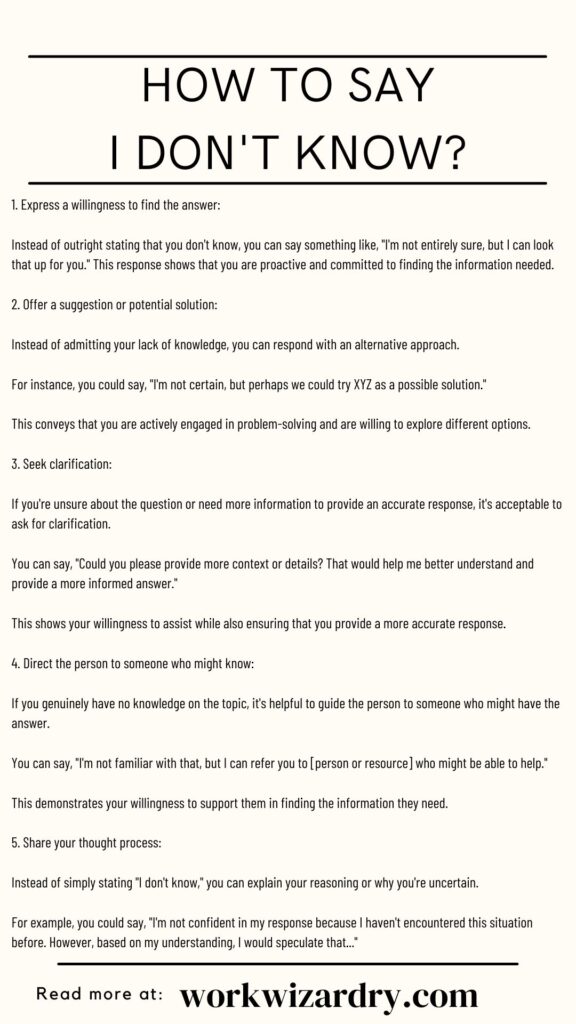
How to say I don’t know?
When it comes to expressing uncertainty or lack of knowledge in a professional manner, it is important to communicate with clarity and confidence.
One way to convey the message of “I don’t know” professionally is to acknowledge the question or inquiry and honestly state that you do not have the information at hand. It is crucial to remain polite and respectful throughout the conversation.
You can use phrases such as “I’m sorry, but I don’t have the answer to that at the moment” or “I’m afraid I don’t have the information you’re looking for.”
These responses demonstrate your willingness to assist while acknowledging your limitations. It is also helpful to offer alternative solutions, such as suggesting to research further or directing the person to someone who may be able to provide the necessary information.
Also read: How to professionally say that’s not my job, this is your job or do your job? (100+ example phrases)
Remember, honesty and professionalism go hand in hand when expressing uncertainty in a professional setting.
Here is your definitive guide on how to say I don’t know:
1. Express a willingness to find the answer:
Instead of outright stating that you don’t know, you can say something like, “I’m not entirely sure, but I can look that up for you.” This response shows that you are proactive and committed to finding the information needed.
2. Offer a suggestion or potential solution:
Instead of admitting your lack of knowledge, you can respond with an alternative approach.
For instance, you could say, “I’m not certain, but perhaps we could try XYZ as a possible solution.”
This conveys that you are actively engaged in problem-solving and are willing to explore different options.
3. Seek clarification:
If you’re unsure about the question or need more information to provide an accurate response, it’s acceptable to ask for clarification.
You can say, “Could you please provide more context or details? That would help me better understand and provide a more informed answer.”
This shows your willingness to assist while also ensuring that you provide a more accurate response.
4. Direct the person to someone who might know:
If you genuinely have no knowledge on the topic, it’s helpful to guide the person to someone who might have the answer.
You can say, “I’m not familiar with that, but I can refer you to [person or resource] who might be able to help.”
This demonstrates your willingness to support them in finding the information they need.
5. Share your thought process:
Instead of simply stating “I don’t know,” you can explain your reasoning or why you’re uncertain.
For example, you could say, “I’m not confident in my response because I haven’t encountered this situation before. However, based on my understanding, I would speculate that…”
This shows that you’re actively thinking about the question and provides some insights, even if you don’t have a definitive answer.
Remember, it’s okay to not have all the answers. The key is to respond respectfully and show a willingness to assist in finding a solution or directing the person to someone who can help.

How to say I don’t know professionally?
When you’re asked a question and you don’t know the answer, it can be tempting to just say “I don’t know.”
But there are better ways to respond that still show that you’re engaged and interested in the conversation.
Here’s a guide on how to say I don’t know professionally to help you express your lack of knowledge without sounding unprepared or uninterested.
1. Acknowledge that you don’t know:
A simple “I’m not sure,” or “I don’t know,” shows that you recognize you don’t have the information. It’s a straightforward way to let your conversation partner know that you haven’t been able to find the answer.
2. Ask for more information:
If you don’t have enough information to answer the question, ask for more. This shows your conversation partner that you’re interested in the topic and want to be able to give an informed response.
3. Suggest a source:
If you don’t know the answer, you can suggest a source that might have the answer. This shows that you are aware of the issue and are willing to help find a solution.
4. Offer to find out:
If you don’t know the answer, offer to look it up. This shows that you’re willing to take the time to get the information your conversation partner needs.
5. Pose a question in return:
If you don’t know the answer, you can ask your conversation partner a related question. This shows that you’re engaged in the conversation and demonstrates that you’re still interested in the topic even if you don’t know the answer.
No matter how you respond when you don’t know the answer to a question, it’s important to remain respectful and engaged in the conversation.
With a bit of practice, you’ll soon be able to respond with confidence even when you don’t have all the information.
The following are some Examples of how to professionally say I don’t know:
1. “I’m afraid my knowledge on that subject is as elusive as a unicorn in a haystack.”
2. “I don’t have the information at hand, but I can help you find the resources to uncover the answer.”
3. “My brain cells seem to have taken an extended vacation on that particular topic.”
4. “I’m currently not equipped with the necessary information to address your query, but I’ll do my best to assist you in finding the right resource.”
5. “I regret to inform you that I’m not familiar with the specifics you mentioned. Is there anything else I may be able to assist you with?”
6. “The answer to your question lies within the realms of a secret society I have yet to uncover.”
7. “I don’t possess that knowledge at the moment, but I can recommend some experts who might be able to help.”
8. “I’m about as knowledgeable on that topic as a goldfish with amnesia.”
9. “Unfortunately, that falls outside the scope of my expertise, but I can direct you to someone who might be able to assist you further.”
10. “I’m sorry, but I don’t have the necessary information to provide a satisfactory response. Is there anything else I can assist you with?”
11. “The answer you seek is currently playing hide-and-seek in the labyrinth of my mind.”
12. “I’m not certain about that particular inquiry, but I can certainly look into it further and get back to you with a more informed response.”
13. “My knowledge on that topic resembles a blank canvas waiting for a Picasso to paint upon it.”
14. “Regrettably, I don’t have access to that information right now, but I can connect you with someone who might be able to assist you better.”
15. “I apologize for any inconvenience, but I’m unable to provide a definitive answer to your question. Can I assist you with anything else?”
16. “The answer you’re seeking is akin to a needle in a haystack of cosmic proportions.”
17. “I’m not entirely sure about that, but I can help you explore alternative possibilities or avenues to find the information you need.”
18. “My knowledge on that subject resembles a shattered mirror—fragmented and incomplete.”
19. “I don’t have the specific information you’re looking for, but I can guide you to relevant resources or experts who might be able to assist you better.”
20. “I regret to inform you that I don’t have the answer to your question. However, I’m more than willing to assist you in any other way I can.”
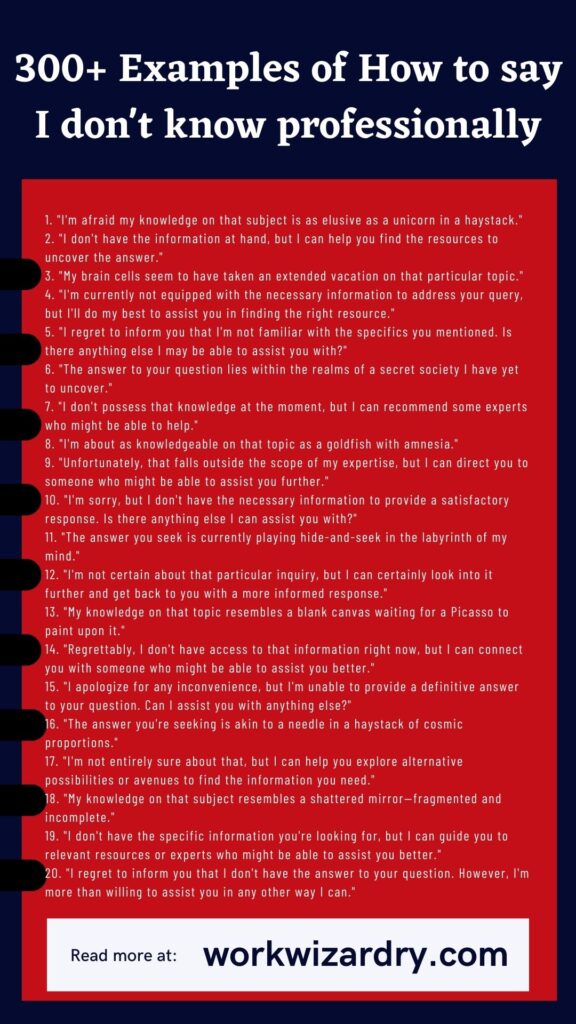
How to professionally say I don’t know?
Here are some tips, strategies and ways to say I don’t know in a professional and polite way:
1. Be honest and direct:
Acknowledge your lack of knowledge upfront and say, “I don’t have the answer to that at the moment, but I’ll find out and get back to you.”
2. Offer alternative resources:
Instead of leaving the person empty-handed, suggest other sources or individuals who might have the information they need.
For example, say, “I’m not sure, but John from the finance team might be able to assist you with that.”
3. Express curiosity:
Show interest in learning and say, “I’m not familiar with that topic, but I’m eager to understand. Could you provide more details, or would you like me to look into it further?”
4. Use humor:
Lighten the situation by injecting a touch of humor.
For instance, say, “That’s a fantastic question, and I wish I had an equally fantastic answer. Unfortunately, I’m as clueless as a goldfish in a maze on this one!”
5. Highlight expertise boundaries:
Explain your area of expertise and clarify that the question falls outside of it.
For example, say, “I specialize in marketing strategy, so I’m not the best person to answer your question about coding.”
6. Offer a hypothetical response:
If you can’t provide a definitive answer, suggest a potential solution or scenario.
For instance, say, “While I don’t have a direct answer, one approach could be to conduct customer surveys to gather insights.”
7. Encourage collaboration:
Instead of admitting ignorance outright, emphasize the importance of teamwork and say, “I think it would be beneficial if we brainstormed this together. What are your thoughts on tackling this challenge?”
8. Reflect on limitations:
Share your thought process and limitations, saying, “I’m currently exploring this area myself, and I’m afraid I don’t have all the answers yet. Let’s collaborate to figure it out.”
9. Showcase willingness to learn:
Demonstrate a growth mindset by expressing your eagerness to expand your knowledge.
Say, “I’m not familiar with that, but I’m always looking for opportunities to learn. Do you have any recommended resources or references?”
10. Follow up promptly:
If you promise to find the answer later, make sure to fulfill your commitment in a timely manner. Delivering on your word demonstrates reliability and professionalism.

Professional way to say I don’t know
Here are some tips and examples for professional way to say I don’t know:
1. Be honest and upfront:
Acknowledge that you don’t have the answer or information at hand.
Example: “I appreciate your question, but I don’t have the information right now. However, I can look into it and get back to you.”
2. Offer alternatives:
Suggest someone else who might have the knowledge or resources to answer the question.
Example: “I’m not sure about that, but I can connect you with John from the technical team who specializes in that area. He will be able to assist you further.”
3. Show willingness to help:
Express your eagerness to assist the person in finding the answer.
Example: “I don’t have the answer at the moment, but I’m committed to finding a solution for you. Let me investigate further and get back to you as soon as possible.”
4. Offer to research:
Propose conducting research or seeking information from reliable sources to provide an accurate response.
Example: “I don’t have that information off the top of my head, but I can conduct some research to find the most up-to-date and reliable data for you.”
5. Ask for clarification:
Seek additional details or specifics to ensure you understand the question before admitting that you don’t know the answer.
Example: “Could you please provide more context or clarify your question? This will help me better understand and assist you.”
6. Avoid guesswork:
Refrain from speculating or making assumptions when you don’t have the necessary information.
Example: “I don’t want to provide you with incorrect information, so I prefer not to speculate. I will do my best to find the accurate details for you.”
7. Offer to follow up:
Promise to follow up with the person once you have obtained the necessary information.
Example: “I don’t have the answer right now, but I will make it a priority to find out for you. Can I get your contact information to provide you with the answer once I have it?”
8. Redirect to resources:
Guide the person to relevant resources or references where they can find the information themselves.
Example: “I don’t have that information at hand, but you might find it helpful to check our company’s website or consult the user manual, as it usually covers such details.”
9. Express gratitude for the question:
Appreciate the person for raising the question, as it allows you to improve your knowledge and learn.
Example: “Thank you for asking that question. It’s an area where I need to further expand my knowledge. I will make sure to explore it and provide you with a comprehensive response.”
10. Continuous learning mindset:
Emphasize your commitment to continuous learning and improvement to demonstrate a growth-oriented attitude.
Example: “I don’t have the answer right now, but I’m always seeking to expand my knowledge and expertise. This is an excellent opportunity for me to learn and grow in this area.”
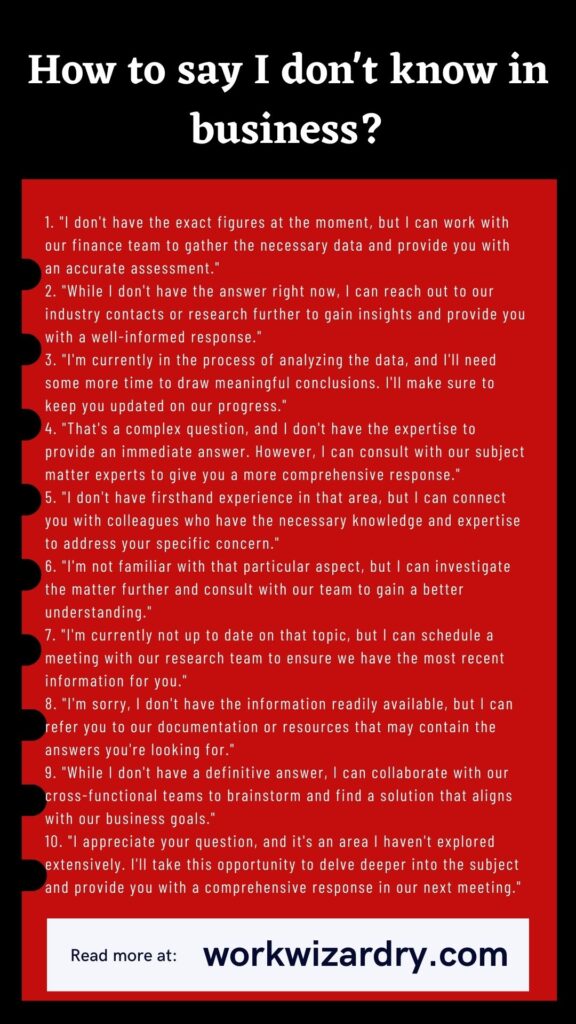
How to say I don’t know in business?
1. “I don’t have the exact figures at the moment, but I can work with our finance team to gather the necessary data and provide you with an accurate assessment.”
2. “While I don’t have the answer right now, I can reach out to our industry contacts or research further to gain insights and provide you with a well-informed response.”
3. “I’m currently in the process of analyzing the data, and I’ll need some more time to draw meaningful conclusions. I’ll make sure to keep you updated on our progress.”
4. “That’s a complex question, and I don’t have the expertise to provide an immediate answer. However, I can consult with our subject matter experts to give you a more comprehensive response.”
5. “I don’t have firsthand experience in that area, but I can connect you with colleagues who have the necessary knowledge and expertise to address your specific concern.”
6. “I’m not familiar with that particular aspect, but I can investigate the matter further and consult with our team to gain a better understanding.”
7. “I’m currently not up to date on that topic, but I can schedule a meeting with our research team to ensure we have the most recent information for you.”
8. “I’m sorry, I don’t have the information readily available, but I can refer you to our documentation or resources that may contain the answers you’re looking for.”
9. “While I don’t have a definitive answer, I can collaborate with our cross-functional teams to brainstorm and find a solution that aligns with our business goals.”
10. “I appreciate your question, and it’s an area I haven’t explored extensively. I’ll take this opportunity to delve deeper into the subject and provide you with a comprehensive response in our next meeting.”

How to say I don’t know in interview?
1. “I’m afraid I don’t have the information at hand, but I would be happy to research and provide you with a thorough response.”
2. “I’m currently not in a position to give a definitive answer, but I can certainly look into it and get back to you.”
3. “While I’m not fully acquainted with that specific aspect, I can connect you with someone who may have the expertise you’re seeking.”
4. “I haven’t had the opportunity to explore that area extensively, but I’m eager to learn more and expand my knowledge.”
5. “That’s an intriguing question. Unfortunately, it falls outside my realm of expertise. Would you like me to find someone who can assist?”
6. “I’m not well-versed in that particular subject matter, but I’m open to gaining more insights and exploring it further.”
7. “I’m not privy to that information presently, but I can make an effort to acquire it or direct you to someone who might have the answer.”
8. “Regrettably, I don’t have the details on hand, but I can explore resources to provide you with a well-informed response.”
9. “I’m currently unfamiliar with that aspect, but I’m committed to self-improvement and would gladly take this opportunity to learn.”
10. “I’m unable to offer a definite answer at this time, but I’m enthusiastic about acquiring more knowledge on the subject.”
11. “That’s an area where I don’t possess expertise, but I’m more than willing to collaborate with others who might have the necessary insights.”
12. “I haven’t encountered that specific situation before, but I’m adaptable and confident in my ability to find a solution.”
13. “I’m not sufficiently acquainted with that topic, but I’m always eager to broaden my horizons and acquire new knowledge.”
14. “I’m sorry, I don’t have the requisite information, but I can delve into the matter and furnish you with a well-informed response.”
15. “At this moment, I don’t have the answer you’re seeking, but I’m committed to ongoing learning and growth, so I will strive to obtain it.”
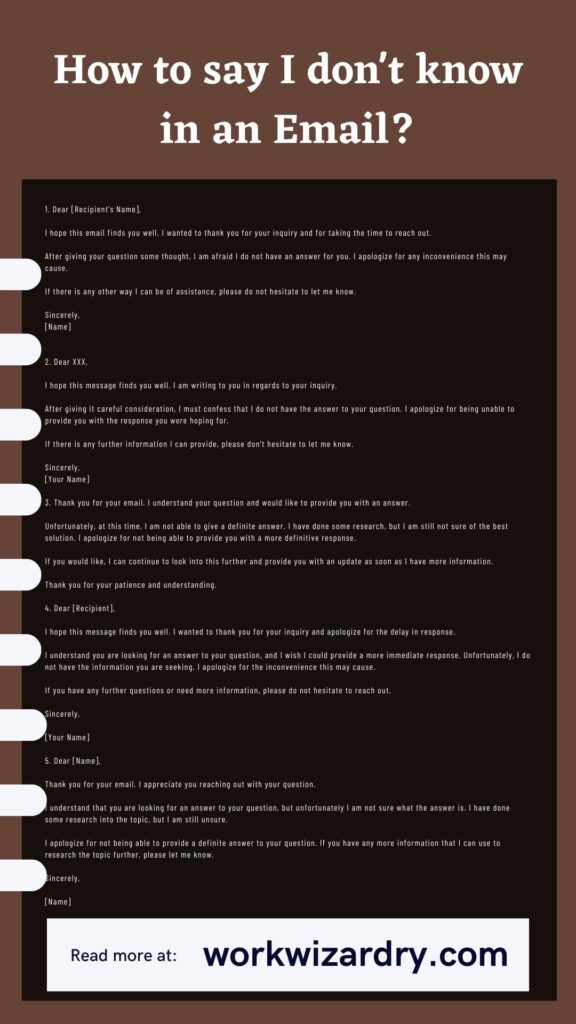
How to say I don’t know in email?
Here are some professional ways to say I don’t know in email:
1. Dear [Recipient’s Name],
I hope this email finds you well. I wanted to thank you for your inquiry and for taking the time to reach out.
After giving your question some thought, I am afraid I do not have an answer for you. I apologize for any inconvenience this may cause.
If there is any other way I can be of assistance, please do not hesitate to let me know.
Sincerely,
[Name]
2. Dear XXX,
I hope this message finds you well. I am writing to you in regards to your inquiry.
After giving it careful consideration, I must confess that I do not have the answer to your question. I apologize for being unable to provide you with the response you were hoping for.
If there is any further information I can provide, please don’t hesitate to let me know.
Sincerely,
[Your Name]
3. Thank you for your email. I understand your question and would like to provide you with an answer.
Unfortunately, at this time, I am not able to give a definite answer. I have done some research, but I am still not sure of the best solution. I apologize for not being able to provide you with a more definitive response.
If you would like, I can continue to look into this further and provide you with an update as soon as I have more information.
Thank you for your patience and understanding.
4. Dear [Recipient],
I hope this message finds you well. I wanted to thank you for your inquiry and apologize for the delay in response.
I understand you are looking for an answer to your question, and I wish I could provide a more immediate response. Unfortunately, I do not have the information you are seeking. I apologize for the inconvenience this may cause.
If you have any further questions or need more information, please do not hesitate to reach out.
Sincerely,
[Your Name]
5. Dear [Name],
Thank you for your email. I appreciate you reaching out with your question.
I understand that you are looking for an answer to your question, but unfortunately I am not sure what the answer is. I have done some research into the topic, but I am still unsure.
I apologize for not being able to provide a definite answer to your question. If you have any more information that I can use to research the topic further, please let me know.
Sincerely,
[Name]
Here are some more examples of how to say I don’t know in an email:
Dear [Name],
1. I’m afraid I do not possess the information you seek at this time, but I am actively researching the matter to provide a comprehensive response.
2. Regrettably, I am currently not in possession of the specific details you require, but I am determined to locate the necessary resources to assist you promptly.
3. While I am not privy to the exact answer you are seeking, I am fully committed to exploring all possible avenues to find a satisfactory resolution.
4. At present, I am unable to offer a definitive response to your inquiry; nevertheless, I assure you that I will exhaust all means at my disposal to uncover the information you seek.
5. I must admit that I am not sufficiently knowledgeable about this topic to provide a concrete answer. However, I am more than willing to collaborate with you in finding a suitable solution.
6. Unfortunately, I find myself unfamiliar with the specific details you require. Rest assured, I will diligently seek out reliable sources to help us unravel this mystery together.
7. It is with regret that I must confess my lack of expertise in this particular area, but I remain committed to assisting you to the best of my abilities by reaching out to relevant experts in the field.
8. While I cannot offer a definitive response right now, I am dedicated to expanding my understanding of the subject matter in order to provide a well-informed response in the future.
9. I humbly acknowledge my present ignorance regarding the matter in question, and I am actively engaged in pursuing further knowledge to address your query adequately.
10. Please accept my sincerest apologies for not being able to provide an immediate answer. I am actively exploring various resources to broaden my knowledge and hope to share a more insightful response soon.
11. I regret to inform you that I am not sufficiently familiar with the specifics you have mentioned. Nevertheless, I am eager to collaborate with you and leverage our collective expertise to find a satisfactory resolution.
12. I must confess that the information you seek eludes me at the moment. However, I am committed to going above and beyond to seek out subject matter experts who may hold the key to this conundrum.
13. I sincerely appreciate your inquiry, but I must admit that I currently lack the necessary information to address your query effectively. Rest assured, I am actively pursuing avenues to rectify this situation.
14. I regret to inform you that I am not presently equipped with the knowledge required to provide an accurate response. Nonetheless, I am eager to delve into the matter further to meet your expectations.
15. It is with utmost humility that I admit my current lack of insight into the matter you have brought forth. I value your trust and will employ every means at my disposal to unravel this puzzle and furnish you with a comprehensive response.
Thank you for your understanding and patience as I work towards acquiring the information you seek. Your confidence in my abilities is greatly appreciated, and I am committed to surpassing your expectations. Please rest assured that I will diligently pursue avenues to resolve this matter promptly.
Warmest regards,
[Your Name]
How to say I don’t know in a nice way?
1. “I’m currently in the process of gathering all the relevant information to provide a comprehensive response.”
2. “I’m afraid I don’t have the specific knowledge on that matter, but I can certainly assist you in finding someone who does.”
3. “I’m not entirely certain at the moment, but I’ll make it a priority to find out and get back to you promptly.”
4. “While I don’t have the answer right now, I can explore various resources and consult with experts in the field to find the best solution for you.”
5. “I appreciate your question, and I’m eager to learn more about that topic myself. Let’s investigate it together.”
6. “That’s an intriguing question. I don’t have the information on hand, but I’m confident we can uncover it through further analysis.”
7. “I don’t have an immediate answer for you, but I’d be happy to conduct research and provide a well-informed response.”
8. “I’m not the most knowledgeable person on this matter, but I’ll connect you with someone who possesses the expertise you’re seeking.”
9. “I’m sorry, I don’t have that information off the top of my head, but I’ll make it a priority to find the right resources and get back to you.”
10. “I’m currently exploring that area, but it’s a complex topic. I’ll ensure to thoroughly investigate and deliver a comprehensive answer as soon as possible.”

How to say I don’t know in a fancy way?
1. “Regrettably, my cognitive faculties are insufficient to provide a definitive response.”
2. “Alas, my mental archives fail to encompass the information sought.”
3. “I find myself bereft of the desired wisdom, for it eludes the reaches of my comprehension.”
4. “Pardon my limited omniscience, as the answer eludes even my most astute ruminations.”
5. “In this labyrinthine realm of knowledge, I am but an ignorant wanderer, unaware of the path you seek.”
6. “My intellectual reservoir is bereft of the necessary data to furnish a suitable reply.”
7. “Albeit reluctantly, I must confess that I am bereft of the celestial insights you seek.”
8. “Within the vast recesses of my intellect, an empty void echoes, for the answer evades me.”
9. “In the realm of cognition, I stand humbled, for the answer you inquire about lies beyond my grasp.”
10. “I find myself residing within the shadowy realm of uncertainty, where knowledge dissipates into enigma.”
11. “My mental alchemy has yet to transmute ignorance into understanding regarding the matter at hand.”
12. “I must humbly admit that I am devoid of the requisite illumination to shed light upon your query.”
13. “With sincere regret, I confess my mental compass fails to navigate the terrain of your inquiry.”
14. “The enigmatic nature of your question renders me an intellectual wanderer, adrift in an ocean of unknowing.”
15. “I stand before you, a veritable enigma, for the answer eludes me like a mirage in the desert of cognition.”
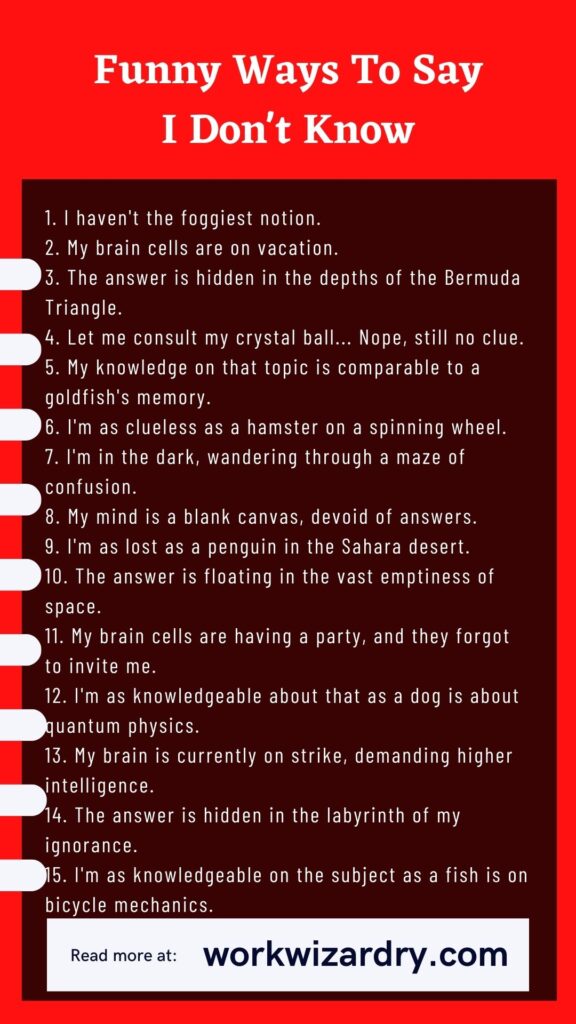
Funny ways to say I don’t know
Here are some funny ways to say I don’t know:
1. I haven’t the foggiest notion.
2. My brain cells are on vacation.
3. The answer is hidden in the depths of the Bermuda Triangle.
4. Let me consult my crystal ball… Nope, still no clue.
5. My knowledge on that topic is comparable to a goldfish’s memory.
6. I’m as clueless as a hamster on a spinning wheel.
7. I’m in the dark, wandering through a maze of confusion.
8. My mind is a blank canvas, devoid of answers.
9. I’m as lost as a penguin in the Sahara desert.
10. The answer is floating in the vast emptiness of space.
11. My brain cells are having a party, and they forgot to invite me.
12. I’m as knowledgeable about that as a dog is about quantum physics.
13. My brain is currently on strike, demanding higher intelligence.
14. The answer is hidden in the labyrinth of my ignorance.
15. I’m as knowledgeable on the subject as a fish is on bicycle mechanics.

Intelligent way to say I don’t know
Are you stuck for an answer when someone asks you a question and you don’t know what to say?
It can be frustrating, especially if the question is one you feel you should know the answer to.
But don’t worry, you don’t have to resort to saying “I don’t know” – here are some alternative phrases that you can use instead.
1. That’s a good question: This phrase acknowledges the other person’s question as a valid one, without you necessarily committing to having the answer. It allows you to think before answering, or to come back later with an answer.
2. I’m not sure: This is a polite way of saying you don’t know the answer. It conveys that you are considering the question, and it can be the start of a discussion.
3. Let me find out: This phrase conveys that you are open to finding out the answer, and that you will get back to the person with an answer as soon as you can.
4. I can’t say for sure: This is a way of acknowledging that you don’t have the answer, but that you are open to further discussion on the matter.
5. I haven’t thought about it: This phrase allows you to admit that you haven’t given the matter much thought before, but that you are willing to consider it.
6. What do you think? This phrase invites the other person to share their opinion and can be an opportunity to start a conversation.
7. That’s an interesting question: This phrase acknowledges the other person’s question and gives you a chance to think before answering.
8. I’m curious: This phrase expresses your interest in the question and can be an opportunity to explore the topic together.
9. Can you help me out? This phrase conveys that you are open to learning more from the other person, and that you are willing to explore the topic further together.
10. I’m still learning: This phrase conveys that you are still in the process of learning, and that you may not have the answer yet.
11. I’m not sure yet: This phrase conveys that you are still in the process of finding the answer, and that you may not have it at the moment.
12. I’m not an expert on this: This phrase conveys that you may not have the answer yet, but that you are open to learning more about the topic.
13. I’ll need to research it: This phrase conveys that you are willing to put in the time and effort to find an answer, and that you are open to further exploration.
14. Let me get back to you: This phrase conveys that you may not have the answer yet, but that you are willing to take the time to look for it.
15. I’m still figuring it out: This phrase conveys that you may not have the answer yet, but that you are open to exploring the topic and finding an answer.
Examples of intelligent way to say I don’t know:
1. That’s a good question:
“What’s the best way to tackle this project?” “That’s a good question – let me think about it for a minute.”
“Do you think this product will be successful?” “That’s a good question – let me do some research and get back to you.”
“What do you think about this idea?” “That’s a good question – why don’t you tell me more about it?”
2. I’m not sure:
“What kind of materials do we need for this project?” “I’m not sure – I’ll have to check with the team and get back to you.”
“Should we invest in this company?” “I’m not sure – let’s look at the data and see what we come up with.”
“What’s the best way to approach this problem?” “I’m not sure – why don’t we brainstorm and see what we can come up with?”
3. Let me find out:
“What time is the meeting tomorrow?” “Let me find out and get back to you.”
“Who is in charge of this project?” “Let me find out and I’ll let you know.”
“How much does this cost?” “Let me find out and I’ll get back to you with an answer.”
4. I can’t say for sure:
“Will this plan work?” “I can’t say for sure – let’s look at the data and see what we come up with.”
“Will this product be successful?” “I can’t say for sure – let’s look at the market and see what we can find out.”
“How long will it take to complete this project?” “I can’t say for sure – let’s look at the timeline and see what we can come up with.”
5. I haven’t thought about it:
“What do you think about this plan?” “I haven’t thought about it – why don’t you tell me more about it?”
“What are the pros and cons of this idea?” “I haven’t thought about it – let’s brainstorm and see what we come up with.”
“Should we invest in this company?” “I haven’t thought about it – let’s look at the data and see what we come up with.”
6. What do you think?
“Should we invest in this company?” “What do you think?”
“What do you think about this idea?” “What do you think?”
“What’s the best way to approach this problem?” “What do you think?”
7. That’s an interesting question:
“Should we invest in this company?” “That’s an interesting question – let’s look at the data and see what we come up with.”
“What do you think about this idea?” “That’s an interesting question – why don’t you tell me more about it?”
“What’s the best way to approach this problem?” “That’s an interesting question – let’s brainstorm and see what we come up with.”
8. I’m curious:
“What do you think about this plan?” “I’m curious – why don’t you tell me more about it?”
“What are the pros and cons of this idea?” “I’m curious – let’s look at the data and see what we can find out.”
“Should we invest in this company?” “I’m curious – let’s look at the market and see what we can come up with.”
9. Can you help me out?
“What kind of materials do we need for this project?” “Can you help me out?”
“What time is the meeting tomorrow?” “Can you help me out?”
“Who is in charge of this project?” “Can you help me out?”
10. I’m still learning:
“What’s the best way to tackle this project?” “I’m still learning – let me think about it for a minute.”
“Do you think this product will be successful?” “I’m still learning – let me do some research and get back to you.”
“How much does this cost?” “I’m still learning – let me find out and I’ll get back to you with an answer.”
11. I’m not sure yet:
“Will this plan work?” “I’m not sure yet – let’s look at the data and see what we come up with.”
“Will this product be successful?” “I’m not sure yet – let’s look at the market and see what we can find out.”
“How long will it take to complete this project?” “I’m not sure yet – let’s look at the timeline and see what we can come up with.”
12. I’m not an expert on this:
“What’s the best way to tackle this project?” “I’m not an expert on this – let me think about it for a minute.”
“Do you think this product will be successful?” “I’m not an expert on this – let me do some research and get back to you.”
“How much does this cost?” “I’m not an expert on this – let me find out and I’ll get back to you with an answer.”
13. I’ll need to research it:
“What kind of materials do we need for this project?” “I’ll need to research it and get back to you.”
“What time is the meeting tomorrow?” “I’ll need to research it and I’ll let you know.”
“Who is in charge of this project?” “I’ll need to research it and I’ll get back to you with an answer.”
14. Let me get back to you:
“Will this plan work?” “Let me get back to you – let’s look at the data and see what we come up with.”
“Will this product be successful?” “Let me get back to you – let’s look at the market and see what we can find out.”
“How long will it take to complete this project?” “Let me get back to you – let’s look at the timeline and see what we can come up with.”
15. I’m still figuring it out:
“What do you think about this plan?” “I’m still figuring it out – why don’t you tell me more about it?”
“What are the pros and cons of this idea?” “I’m still figuring it out – let’s brainstorm and see what we come up with.”
“Should we invest in this company?” “I’m still figuring it out – let’s look at the data and see what we come up with.”
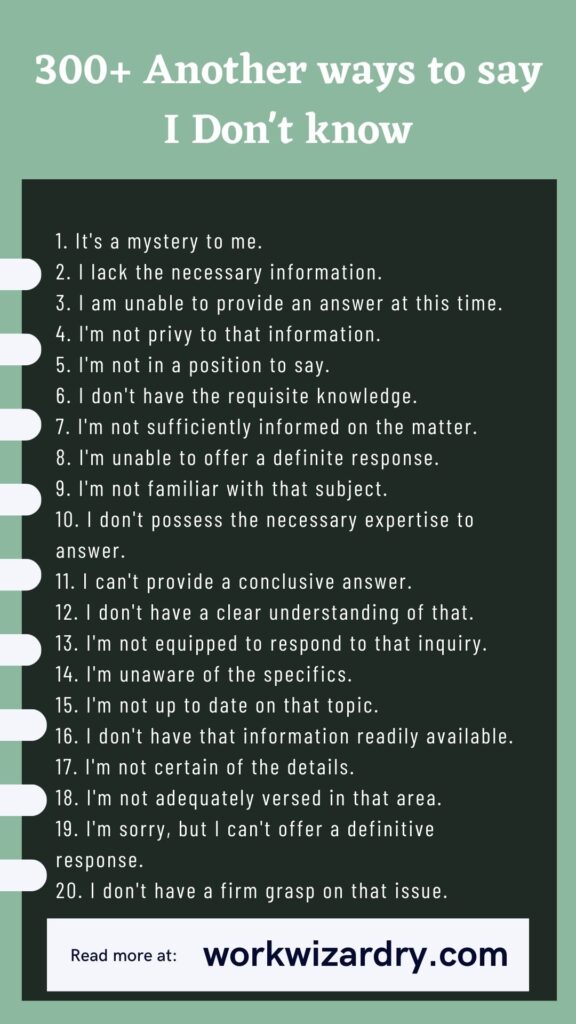
Another way to say I don’t know
Here are some another way to say I don’t know politely:
1. It’s a mystery to me.
2. I lack the necessary information.
3. I am unable to provide an answer at this time.
4. I’m not privy to that information.
5. I’m not in a position to say.
6. I don’t have the requisite knowledge.
7. I’m not sufficiently informed on the matter.
8. I’m unable to offer a definite response.
9. I’m not familiar with that subject.
10. I don’t possess the necessary expertise to answer.
11. I can’t provide a conclusive answer.
12. I don’t have a clear understanding of that.
13. I’m not equipped to respond to that inquiry.
14. I’m unaware of the specifics.
15. I’m not up to date on that topic.
16. I don’t have that information readily available.
17. I’m not certain of the details.
18. I’m not adequately versed in that area.
19. I’m sorry, but I can’t offer a definitive response.
20. I don’t have a firm grasp on that issue.
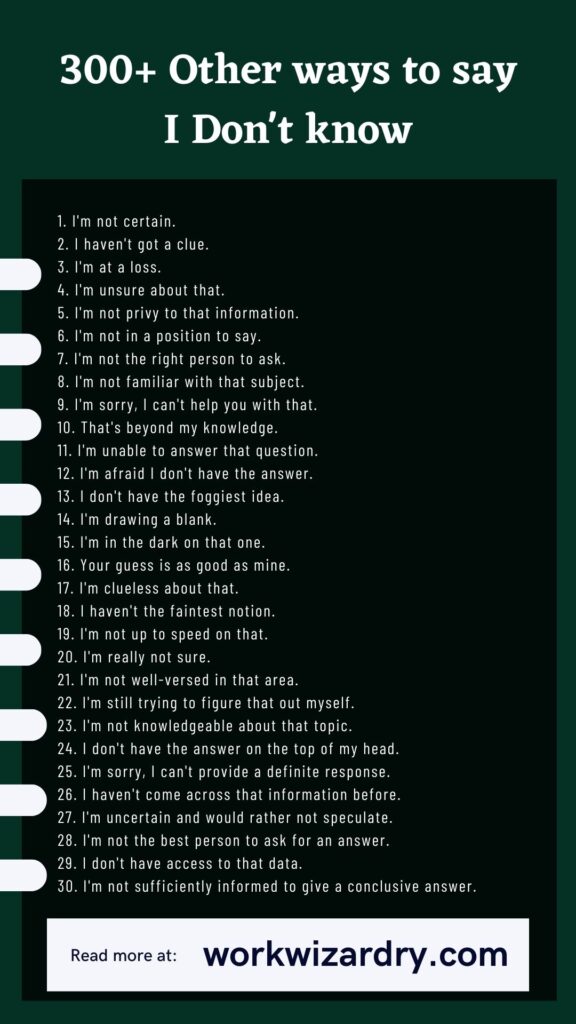
Other ways to say I don’t know
The following are a few other ways to say I don’t know:
1. I’m not certain.
2. I haven’t got a clue.
3. I’m at a loss.
4. I’m unsure about that.
5. I’m not privy to that information.
6. I’m not in a position to say.
7. I’m not the right person to ask.
8. I’m not familiar with that subject.
9. I’m sorry, I can’t help you with that.
10. That’s beyond my knowledge.
11. I’m unable to answer that question.
12. I’m afraid I don’t have the answer.
13. I don’t have the foggiest idea.
14. I’m drawing a blank.
15. I’m in the dark on that one.
16. Your guess is as good as mine.
17. I’m clueless about that.
18. I haven’t the faintest notion.
19. I’m not up to speed on that.
20. I’m really not sure.
21. I’m not well-versed in that area.
22. I’m still trying to figure that out myself.
23. I’m not knowledgeable about that topic.
24. I don’t have the answer on the top of my head.
25. I’m sorry, I can’t provide a definite response.
26. I haven’t come across that information before.
27. I’m uncertain and would rather not speculate.
28. I’m not the best person to ask for an answer.
29. I don’t have access to that data.
30. I’m not sufficiently informed to give a conclusive answer.
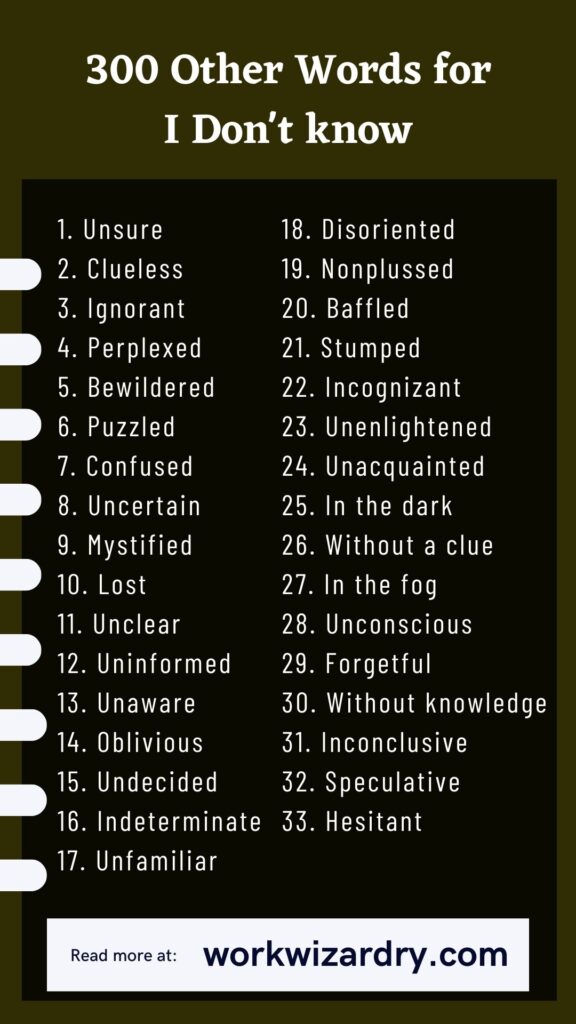
Other words for I don’t know
Here are some other words for I don’t know:
1. Unsure
2. Clueless
3. Ignorant
4. Perplexed
5. Bewildered
6. Puzzled
7. Confused
8. Uncertain
9. Mystified
10. Lost
11. Unclear
12. Uninformed
13. Unaware
14. Oblivious
15. Undecided
16. Indeterminate
17. Unfamiliar
18. Disoriented
19. Nonplussed
20. Baffled
21. Stumped
22. Incognizant
23. Unenlightened
24. Unacquainted
25. In the dark
26. Without a clue
27. In the fog
28. Unconscious
29. Forgetful
30. Without knowledge
31. Inconclusive
32. Speculative
33. Hesitant
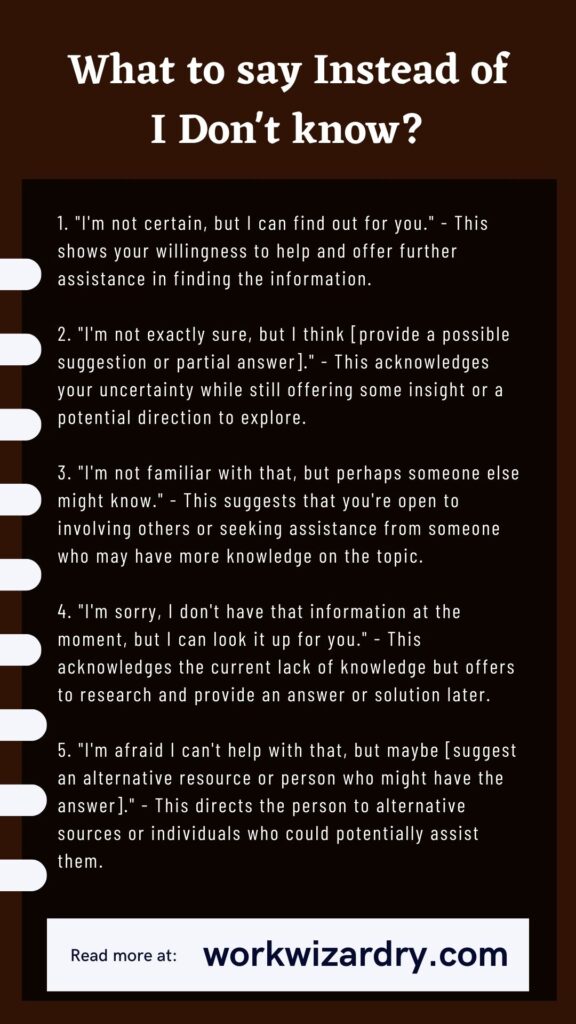
What to say Instead of I don’t know?
Instead of saying “I don’t know,” you can use alternative phrases or responses that convey a similar meaning while providing a more thoughtful or helpful response. Here are a few options:
1. “I’m not certain, but I can find out for you.” – This shows your willingness to help and offer further assistance in finding the information.
2. “I’m not exactly sure, but I think [provide a possible suggestion or partial answer].” – This acknowledges your uncertainty while still offering some insight or a potential direction to explore.
3. “I’m not familiar with that, but perhaps someone else might know.” – This suggests that you’re open to involving others or seeking assistance from someone who may have more knowledge on the topic.
4. “I’m sorry, I don’t have that information at the moment, but I can look it up for you.” – This acknowledges the current lack of knowledge but offers to research and provide an answer or solution later.
5. “I’m afraid I can’t help with that, but maybe [suggest an alternative resource or person who might have the answer].” – This directs the person to alternative sources or individuals who could potentially assist them.
The key is to respond politely, showing your willingness to help or explore further, even if you don’t have an immediate answer.
Different ways to say I don’t know
Response 1: “I’m not certain, but I’ll do some research and get back to you as soon as possible.”
Response 2: “I’m afraid I’m not familiar enough with that topic to provide a confident answer.”
Response 3: “I’m not sure off the top of my head, but I’ll be happy to look into it further for you.”
Response 4: “I’m sorry, but I don’t have enough information to give you a definitive answer at this time.”
Response 5: “I don’t have the expertise or knowledge to answer that question, but I can connect you with someone who might.”
Response 6: “That’s a great question, but unfortunately, I don’t have the answer. Can I recommend someone who might be able to help?”
Response 7: “I’m sorry, but I’m not qualified to answer that question. Would you like me to find someone who is?”
Response 8: “I’m not entirely certain, but I believe the answer might be; [provide a possible solution].”
Response 9: “I’m not sure, but I’ll check with my team and get back to you with an answer as soon as possible.”
Response 10: “I’m afraid I don’t have the information you’re looking for. Can you provide more details, or would you like me to direct you to someone who can help?”





